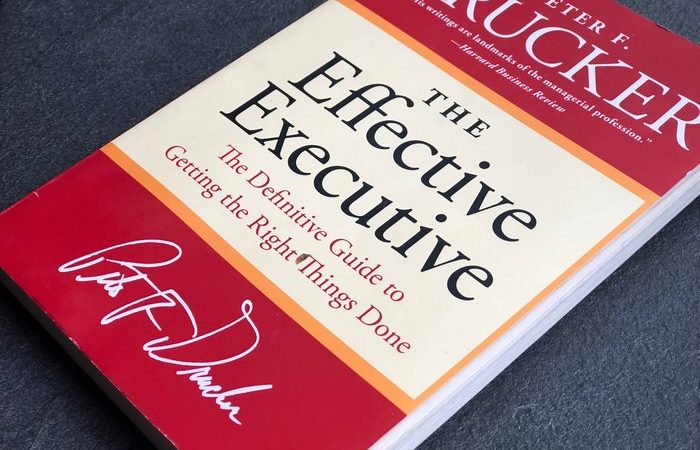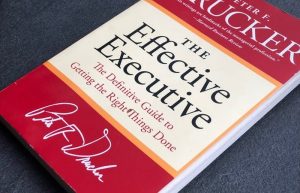I really love reading. I am obsessed with books. You know that saying: collecting (buying) books and reading them are two completely different hobbies. I couldn’t agree more and I add that I enjoy both aspects. In this series I write about various books I read, but these are by no means professional book reviews. Rather my goal is to provide short book summary and inspire my readers to maybe pick these books and read them themselves.
One of the more recent ones I read is The Effective Executive by Peter Drucker. Few words about the author. Peter Drucker is considered by many to be the father of modern management. During his rich career as a consultant, editor and educator, his writing showed real understanding of and sympathy for the difficulties and demands faced by managers. Drucker’s ideas changed how modern corporations work and inspired many changes far ahead of their time.
When it comes to me, becoming the team lead for verification in Veriest has opened a whole new horizon of challenges and opporunities for me. Among other aspects, it motivated me to research and learn more about human relations, leadership, comunication and mentoring topics. In this post I will present The Effective Executive book, give my opinion about it and then provide favorite quotes from it.
Many people become some sort of managers without actually knowing how to be one. Being manager is one thing. Being effective manager is a whole new challenge. Telling from the personal experience, I learned many things along the way, but after reading this book, I can safely claim that everyone should read it before venturing into management waters. In his book, Drucker explains that there are five crucial habbits of effectiveness and they can all be learned:
1) Know where your time goes.
2) Focus on outward contribution.
3) Build on strengths.
4) Concentrate on the few major areas where superior performance will produce outstanding results [this is the 80/20 principle, I read separate book on that and loved it].
5) Make effective decisions.
Book explains and elaborates on all aspects of these habits and I loved them. I especially loved the emphasis on the fact that these habits can be leared. You are not born a good manager, you become one by constant learning and personal development.
Anyway, below are my favourite quotes from the book. Enjoy!
Your first responsibility is to determine your own distinctive competences what you can do uncommonly well, what you are truly made for and then navigate your life and career in direct alignment.
Work how you work best (and let others do the same). Some people work well at night; others work better in the morning. Some absorb information best by reading, others by listening. Some thrive in full immersion; others work better in short bursts with variety in the day. Some are project oriented; others are process oriented. Some need vacations; others think the best part about vacations is that they end. Some prefer teams, whereas others produce much greater impact working alone..
Effectiveness can be learned and it also has to be learned.
Effectiveness is what executives are being paid for, whether they work as managers who are responsible for the performance of others as well as their own, or as individual professional contributors responsible for their own performance only.
Time is an executive’s scarcest and most precious resource.
Without an action plan, the executive becomes a prisoner of events.
Allocating the best people to the right positions is a crucial, tough job that many executives [do poorly], in part because the best people are already too busy.
Making good decisions is a crucial skill at every level. It needs to be taught explicitly to everyone in organizations that are based on knowledge.
Good executives focus on opportunities rather than problems. Problems have to be taken care of, of course; they must not be swept under the rug. But problem solving, however necessary, does not produce results. It prevents damage. Exploiting opportunities produces results.
Effective executives put their best people on opportunities rather than on problems.
Listen first, speak last. Intelligence, imagination, and knowledge are essential resources, but only effectiveness converts them into results. By themselves, they only set limits to what can be attained. The greatest wisdom not applied to action and behavior is meaningless data.
Organization is a means of multiplying the strength of an individual.
And effectiveness is the one tool to make the resources of ability and knowledge yield more and better results.
Effective executive starts out with the question – what results are expected of me?
Effective executives concentrate on the few major areas where superior performance will produce outstanding results.
The recurrent crisis is simply a symptom of slovenliness and laziness.
For every organization needs performance in three major areas: It needs direct results; building of values and their reaffirmation; and building and developing people for tomorrow.
Effectie Executive asks himself: What can I and no one else do which, if done really well, would make a real difference to this company?
The executive who is concerned with what a man cannot do rather than with what he can do, and who therefore tries to avoid weakness rather than make strength effective is a weak man himself.
An organization needs to bring in fresh people with fresh points of view fairly often. If it only promotes from within it soon becomes inbred and eventually sterile.
Aim high, aim for something that will make a difference, rather than for something that is safe and easy to do.
The trouble with miracles is not, after all, that they happen rarely; it is that one cannot rely on them.
The effective executive encourages opinions.
Above all, disagreement is needed to stimulate the imagination. The effective decision-maker, therefore, organizes disagreement.
Disagreement converts the plausible into the right and the right into the good decision.
Self-development of the effective executive is central to the development of the organization, whether it be a business, a government agency, a research laboratory, a hospital, or a military service. It is the way toward performance of the organization. As executives work toward becoming effective, they raise the performance level of the whole organization.
Organizations are not more effective because they have better people. They have better people because they motivate to self-development through their standards, through their habits, through their climate.
Have you recently read any management/leadership books that you liked? Let me know in the comments!




